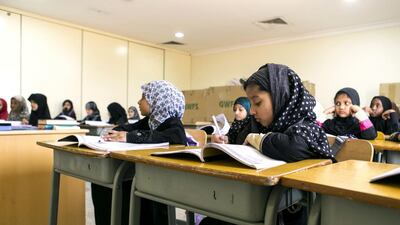I've followed the debate over the UAE and Finnish models of education with great interest. Peter Hatherley-Greene began the discussion by writing that the Finnish model of education cannot be exported to the UAE.
His argument was followed by several other commentators, including Taneli Kukkonen from NYU Abu Dhabi, who wrote that there are actually more commonalities than you might think.
First, let me say that this debate is exactly what we need. Finns have always been willing to share their views on education and do so with no hidden agenda.
In contrast to Dr Hatherley-Greene’s opinion, we can both gain by exchanging ideas and models behind the various education systems and practices.
By allowing our own education system and our current practices to be open to criticism and testing, as well as through appraisals and second opinions, we have been able to develop our education system.
We see that by sharing our joy for learning – as well as our thoughts and ideas – the value of them doubles. Especially in a world of constant change, we need to educate people who are open to new ideas and willing to change in order to live a good life and promote business as well as society. Trust and openness are important elements in all of this.
Instead of rooting both the Emirati and Finnish cultures in the harsh living conditions of 8,000 years ago, we should be thinking how much we’ve achieved in the past century and where we are aiming to go in the next 100 years.
Cultural change is slow but constant. Had I written the first article, I would have started the comparison by stating that the Middle East has always been a lively hub for exchange between people with different backgrounds, cultures, skills and trade. Exactly the kind of place where innovation happens.
In an environment such as this, openness to all ideas, especially in the field of education, is what is needed – rather than excluding something that is already a proven success. If it has worked well for us in Finland, I am sure that the model has elements that can be adjusted for use in the UAE.
In Finland, we are aiming to be the best place in which to develop education systems.
We have always been willing to borrow those good ideas that are worth borrowing, and turn them, through close cooperation, into something our teachers can use for our own model.
We never say that any model should be excluded. The Finnish teachers returning from the Arabian Gulf say that they themselves have learnt so much there.
Rapid change in education systems is impossible. Educational transformation should be undertaken using lessons learnt from around the world. That is also where we have rooted out education system and reforms.
I agree that UAE policymakers should be careful when borrowing ideas from other countries.
What decision-makers and policymakers need to get right is the big picture for the educational landscape of their nation. Luckily today, information on all education systems and models is readily available and results are visible.
Jouni Kangasniemi is head of development at the ministry of education and culture in Finland

